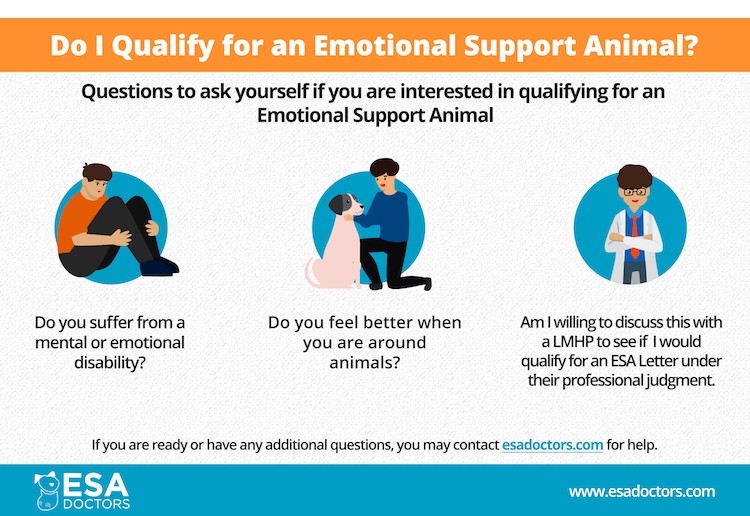Most pet owners will say that their animals brighten their day. While it’s true that most pets offer amusement and affection, emotional support animals (ESA) do so much more. For people who struggle with a mental or emotional disorder, an ESA can be what helps them to heal. And although some people might feel ashamed of needing an emotional support animal, the truth is research indicates ESA’s can help save a life.
Emotional Support Animals are More Than Pets
Just like our physical health, our mental health impacts our daily lives. According to data from Mental Health America, one in five people have a diagnosable mental disorder. Of the individuals with a mental disorder, 56% do not receive any form of treatment. Without treatment, mental and emotional problems may worsen and affect relationships, finances, school, and work. Poor mental health can also impact physical health, creating another layer of issues to manage.
Fortunately, with treatment, people with mental and emotional conditions can learn to manage their symptoms. By receiving treatment, they improve their quality of life and reduce their risks for other issues later in life. And although traditional treatments for mental and emotional disorders — like medication and therapy — are effective, newer treatments can also boost mental health.
Animals as a Mental Health Treatment
An emotional support animal is a doctor-ordered treatment, just like medication and talk therapy. Similar to a drug prescription, a doctor or licensed mental health professional must write a letter stating that an animal is necessary for an individual’s treatment regimen. The animal, as a treatment, helps to manage the disruptive symptoms stemming from a person’s mental or emotional disorder.

The Research Confirming the Effectivness of Animals
Research indicates that pets offer treatment advantages for people with mental health conditions. A 2018 research article reviewed results from 9 comprehensive databases and found the following:
1. Animals alleviate feelings of worry, isolation, and loneliness
In particular, people who struggle with Post-Traumatic Stress Disorder (PTSD) benefit from the calming presence of an animal. Having a source of unconditional affection and comfort offers people with mental health conditions a sense of security, allowing them to improve their mental health further.
2. Animals offer a consistent source of physical interaction
For example, the routine of feeding, bathing, and caring for an animal can distract an individual from their symptoms, teaching them how to manage symptoms independently. For individuals who have auditory hallucinations, these activities can help redirect their attention from the voices in their heads. In addition, the physical responsibility of caring for an animal encourages positive behavioral changes.
3. Animals serve as links to the outside world
Taking a dog on a walk, going to the vet, and setting time for the dog park exposes individuals to the outside world, fostering a sense of community. Spontaneous interactions with others also open doors to new friendships and social support, reducing feelings of loneliness.

4. Animals provide a sense of self-worth and purpose
For individuals who struggle with severe depression, this aspect of animal ownership may be the most important. A sense of purpose can be the difference between life and death. Animals serve as a protective factor against thoughts of suicide, giving people with depression a reason not to harm themselves.
Why Some People Feel Shame About Emotional Support Animals
The shame ESA owners may feel typically stems from two sources:
- The lack of understanding people have over the use of animals for mental health treatment.
- The fraudulent use of ESA by people who do not have an ESA letter or a legitimate mental or emotional disorder.
Unfortunately, mental health conditions still carry a stigma. Simply having a mental or emotional disorder can leave people feeling ashamed, and needing an ESA might make that feeling worse. Fortunately, the tides are turning. More and more, people are concluding that animals can do more than look cute. Animals can help heal.
In addition to the social stigma that mental health disorders carry, fraudulent or disruptive “ESA” owners deter people from taking legitimate ESA owners seriously. ESA owners must take it upon themselves to obtain the correct paperwork and conduct themselves appropriately. Every ESA owner represents other Individuals who have ESAs, and their legitimacy and behavior speak volumes.

Emotional Support Animal and You
Emotional support animals can help manage a variety of emotional and mental health conditions. If properly obtained and documented, a legitimate ESA letter allows the following:
- The ESA may reside with their owner, even in “no pets allowed” housing. Pet fees do not apply to ESA in housing areas.
- Although current Air Carrier Access Act (ACAA) laws do not require airlines to allow ESA into their cabins, some airlines still allow ESAs. However, the airline may ask for documentation regarding the ESA.
Should ESA owners feel ashamed about needing an ESA? Definitely not. ESAs are a valid treatment option for people with mental or emotional disorders. The emotional support animal may enable their handlers to live a more fulfilling life and, in some cases, can even help save a life.
If you’re ready to take back control of your life, see if you qualify for an ESA Letter by connecting with a therapist online.










I run a womens shelter and clients are there because they have been abused. They want their animals to live in our shelter. I don’t support that and here is why. Our shelter has common areas. Some of our clients have sever allergies. I can not allow an ESA to effect the health of others. Secondly, my clients are not the most responsible people and therefore they are unable to make sure the animal is trained. How would you like dog pee and poop in your house? Sanitation is always a problem even without animals. We don’t have the funding to implement an ESA program but if any of you would like to pay for it, please let me know.